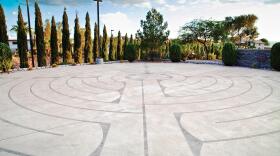An indie bookstore downtown: They have built it, but will you come? The answer will say a lot about this city
In the few weeks after The Writer’s Block bookstore opened on Fremont Street, its best-selling book was Fifty Shades of … ha, no … actually, it was James Patterson’s — aw, still kidding. It was, in fact, nothing so muggle: The Myth of Sisyphus, an inquiry into the legitimacy of suicide by the late French philosopher Albert Camus. Quelle surprise!
Yeah, co-owner Drew Cohen, who orders the books, isn’t sure what to make of that, either. Simple, if weird, coincidence? Irresistible book-cover design? (It is rather artsy.) A sudden, viral conviction that midcentury European absurdism is the best way to understand Las Vegas in 2014? Or could it be that there really are some intelligent people here who, given the chance, will buy intermediate and advanced books, even by dead Frenchmen?
The Writer’s Block (1020 Fremont St.) is a 2,450-square-foot bet — gesture of hope? leap of faith? fool’s errand? — on that last one. It’s an intimate space, fiction on the left, non- on the right, a decorative flight of fake birds overhead and quirkiness galore. (The back of the space houses a literacy-education space that’ll open soon.) A Barnes & Noble book-orderer might find the selection bafflingly small and light on populist page-bait — no long shelves of David Baldacci chart-toppers. The Writer’s Block curates toward a smaller, literary audience, and (theoretically) therein lies its future.
If you’re among that audience, and you’ve patiently awaited a development like this, you’re elated but perhaps a little worried. Vegas seems like a fragile ecosystem for a literate indie bookstore. Don’t wanna get too attached, do you, in this city rife with contraindicators perhaps best summarized by The Daily Beast naming this the dumbest city in America a few years ago? (Of a possible 200 points in the site’s criteria, Vegas scored 3.33.) How long can a defiantly intelligent bookstore hold out in a city with our low, low rate of adults with college degrees? Perhaps you’ve also heard about our bottom-ranking school system. And our citizenry has taken to voting against such civilizing institutions as schools and libraries. Top that with national rises in e-book purchases and the decline of physical bookstores, and there are good reasons to temper your woo-hoo!
“I didn’t necessarily know that to be the reputation of Las Vegas” before arriving, Cohen says. The research he and partner Scott Seeley did beforehand had more to do with the logistics and economics of running a bookstore — neither had that kind of experience — than with the peculiarities of the town they’d been recruited to by The Downtown Project.
“In coming here, we did hear and continue to hear a lot about the abysmal state of the education system,” Cohen says. “That said, it’s a big city, and any big city has intellectually minded people, it has writers, it has people who read, and we’ve just met tons of those people, and they continue to come in.” So far, he says, they seem to cross demographic lines, including lots of high-school and college kids, and they don’t necessarily want the mainstream stuff. For them, an indie bookstore serves a filtering function, sifting out the mass-market stuff and presenting the cooler, harder-to-find works.
And so, quelle surprise, the books Cohen was unsure about stocking — your epic Knausgaardian fictions, your collections of Roxanne Gay’s offbeat feminist essays — get picked up, while stuff he thought would pander to mainstream tastes, not so much. “In some categories I can buy a little more esoteric or sophisticated than I thought, because there seems to be a demand for it.” (Full disclosure: I bought the store’s very first copy of Sisyphus, since midcentury European absurdism is the best way to understand Las Vegas in 2014.)
Unless he actually weighed them, “ tons of those people” is a pretty subjective measurement, but it does make you wonder just how many book-lovers it’ll take to sustain The Writer’s Block. An anecdote: “I had a very eye-opening moment about a year before we opened,” Cohen says. “We were out in the suburbs here, and we went to a Barnes & Noble. I saw that they had four hardback copies of The Letters of Ernest Hemingway, Vol. 2. No Vol. 1, just Vol. 2, and four copies of it.”
The question implied by such mindless shelf-stocking — will there ever be four people in Las Vegas who need to fill that specific hole in their Hemingway letters collection? — points to an advantage The Writer’s Block has. “We’re really small,” he says. Think of it as economies of downscale: small space, small staff, small overhead = more pinpoint control. “We basically buy books to replace the books we just sold.” If he carries Vol. 2 of Hemingway’s letters, it’ll be because someone actually wants it. That responsiveness to micro-changes in customer taste means more freedom to carry books by dead French philosophers. “The people who are still buying print books are by and large book-lovers,” Cohen says, notwithstanding the steady production of James Patterson hardbacks, “who by and large have similar tastes and look for similar things, and those are things that independent bookstores can carry for that audience, whereas big-box retailers don’t have that luxury.”
Cohen sees the e-book battle mainly playing out between Amazon and large chain stores, both of which are stuck in a high-volume business. The Writer’s Block can (theoretically) prosper several levels below this clash of titans, even as completely opposite cultural movements steer specific customers through its doors. “We're banking on it,” Cohen says when I ask whether the store will benefit from the ongoing interest in the artisanal, the quirky, the non-mass-market. Those readers want the distinct tactile and intellectual experience of a printed book.
Still, these are tough times for indie booksellers. New York magazine recently broke down the finances of The Strand, one of the flagships of the biz. Bottom line: If it didn’t own its building, the store would likely be on death row.
All of which, I suppose, makes the arrival and, fingers crossed!, survival of The Writer’s Block more than just a welcome addition to the hipster infrastructure of East Fremont. It also puts a few ounces of good weight on our cultural scales, helping counterbalance some of the qualities that feed The Daily Beast’s — and, too often, our own — view of who we are.








